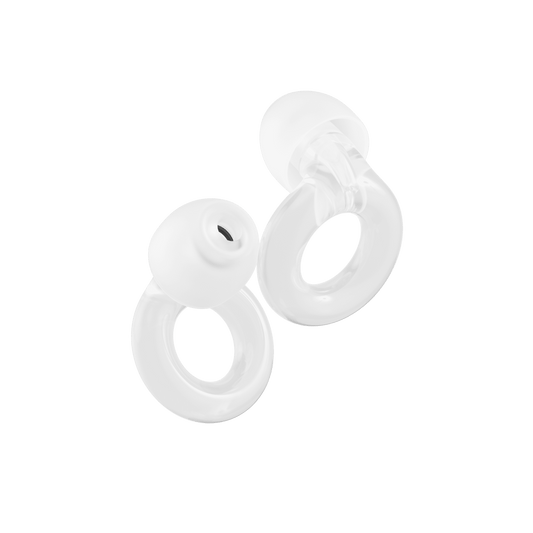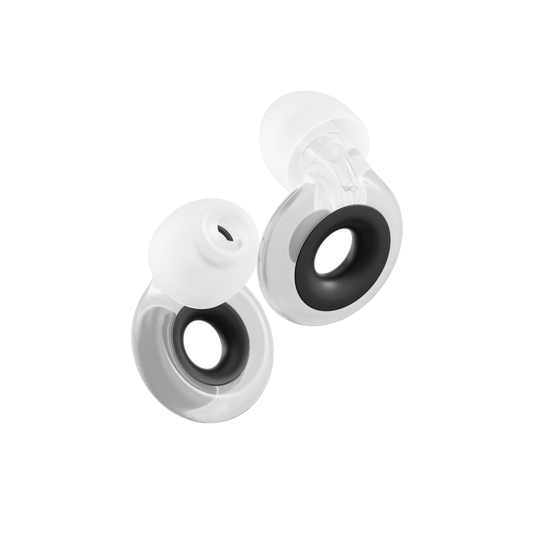Key takeaways:
- One of the main causes of tinnitus is hearing loss – so if you’re regularly in loud environments, it’s important to take steps to protect your ears.
- It’s important to protect your ears with earplugs or ear defenders when in loud places, like festivals, nightclubs, noisy workplaces and when traveling. This will reduce the amount of noise that reaches your eardrums, reducing your risk of developing tinnitus.
- Tinnitus can sometimes occur when you’re feeling anxious or stressed, so keeping your stress levels should help to reduce your risk
- It can also be caused by ear infections, so take care to look after your ears – don’t put cotton buds or any other objects inside them!
Prevention is better than cure, right? Especially when it comes to your ears.
Properly protecting your ears can go a long way towards tinnitus prevention. But first things first: what exactly is tinnitus? Simply put, it’s when you experience a ringing in one or both of your ears that’s not from an external source.
In this blog post, we’re going to look at how to prevent tinnitus – as well as learning how to prevent tinnitus from getting worse, if you already suffer from the condition.
Understanding tinnitus
Tinnitus is a ringing or buzzing sound in your ears – but it’s not actually from an external source. It’s the perception of sound when there’s no external noise present. It can happen in one ear or both ears at the same time, and can either be low or high pitched.
It affects everyone differently. For some people, it’s a mild annoyance – but for others, it can be debilitating.
Identifying causes and risks
Tinnitus isn’t a disorder in itself, but rather it’s usually a symptom of an underlying health condition. It’s caused by an issue with the way the ear hears sounds and how they’re interpreted by the brain.
Some of the most common causes of tinnitus include:
- Age-related hearing loss
- Noise-induced hearing loss
- Ear canal blockage
- Sinus infection
- Certain medications
- Problems with your jaw or temporomandibular joint (TMJ)
- Ménière's disease
- Problems with your blood pressure
- Head or neck injuries
- Anemia, or iron deficiency
- Acoustic neuroma, a rare, non-cancerous tumor
Tinnitus can either be temporary or permanent, depending on the cause of the buzzing in your ears. If your tinnitus is caused by something like a build-up of earwax, then it’ll usually go away once the earwax has been removed.
But if your tinnitus is caused by hearing loss, either noise-induced or age-related hearing loss, it’s irreversible. So the best thing you can do is to stop yourself from getting tinnitus in the first place.
Tinnitus prevention strategies
If you want to prevent tinnitus, there are several things you should keep on top of. These will help to reduce the chances of you developing tinnitus, as well as prevent it from getting any worse, if you already suffer from ringing in your ears.
Properly care for your ears
If you regularly stick cotton buds in your ears – stop what you’re doing, immediately! Never use cotton buds to clean your ears. Your ears are naturally self-cleaning, so you don’t need to put anything inside your ears to try to remove wax.
If earwax is an issue for you, simply talk to your doctor who will offer treatment, by recommending either olive oil drops or an extraction.

Avoid ear infections
Tinnitus can be brought on by ear infections, which can be caused by a number of things.
If you use earplugs or hearing aids, make sure you clean them regularly in line with their instructions.
When you feel any ear pain or feel vertigo, either of these could point to an ear infection. So make sure you’re checking in with your doctor or pharmacy to get to the root of the problem.
Keep your stress levels low
Tinnitus can sometimes occur when you’re feeling anxious or stressed. The best thing you can do is lead a balanced lifestyle.
One of the best ways to reduce your stress levels is to work on having a healthy work/life balance. Working too many hours can throw your mental health out of kilter. If you feel stress rising, take time for yourself to do something that relaxes you – whether it’s knitting, art, going for a run or listening to music.
Above all, remember that your mental health is just as important as your physical health.
Avoid prolonged exposure to loud noises
The most important thing you can do when it comes to tinnitus prevention is to use hearing protection.
Protecting your ears is vital if you want to avoid tinnitus. And there are some great products out there to help you with this.
Wear earplugs for tinnitus if you’re going to be in a space where noise levels are at 85 dB or higher – anything at this level is unsafe for your ears.
Earplugs and ear defenders are another great way to protect your ears, particularly if you work in a loud environment with heavy machinery, for example.
If you’re a live music lover, don’t stand too close to speakers! You can still enjoy the music – perhaps even more so – from a safe distance.
There’s no need to avoid noisy environments. When it comes to preventing tinnitus, you just need to make sure that you protect your ears. By reducing the volume to a safer level, you’re more likely to protect yourself from developing tinnitus – as well as from hearing damage and hearing loss.
Recognising the need for medical attention
Tinnitus can be incredibly frustrating, but for some people, that’s as bad as it gets. But for some people, tinnitus can be indicative of something potentially more serious. If you’re concerned about your tinnitus, or have the following symptoms, it’s important to see a doctor or audiologist:
- Persistent or worsening tinnitus symptoms
- Tinnitus accompanied by hearing loss
- Tinnitus after head injury
- Sudden onset of tinnitus without an apparent cause
- Tinnitus in children or elderly individuals
It may not be anything to worry about, but it’s always worth getting checked out by a professional if you’re concerned about your hearing health.

Protect your ears from noise
So, can tinnitus be prevented? The answer is yes – but it depends on the type of tinnitus. If you have tinnitus that’s caused by hearing loss, then it is, unfortunately, irreversible.
That means, as we’ve already said, that the best way to avoid developing tinnitus or prevent tinnitus from getting worse is to protect your hearing.
There are various ear protection options available, depending on your preferences, needs and budget. These include earplugs, which are ideal for loud environments like concerts and festivals. They reduce noise to a safer level – and if you choose the right earplugs, like Loop Experience, they filter sound waves rather than blocking them out, which means you can still hear everything that’s happening perfectly. Plus, they’re reusable and portable, meaning you can use them over and over again, whenever you need to reduce background noise.
We’ve also got Loop Switch™ 2, which offer the convenience of 3 earplugs in 1. So if you’re looking for earplugs you can use in any situation, from concerts to commuting, and from sleeping to deep focus, Switch are the ones for you.
Ear defenders are another good option for noisy workplaces and industrial environments, when you need high levels of noise reduction.
If you listen to a lot of music using headphones, then it’s a good idea to keep an eye on how loud the noise is. The Hearing Health Foundation recommends that you listen to music at no more than 50-60% of the maximum volume when listening to music using headphones or earbuds. Most smartphones have volume limiters, allowing you to set restrictions on how loud you’re able to listen to music – keeping your ears safe while you still enjoy your favorite tunes.
- Tinnitus after head injury
- Sudden onset of tinnitus without an apparent cause
- Tinnitus in children or elderly individuals
It may not be anything to worry about, but it’s always worth getting checked out by a professional if you’re concerned about your hearing health.

Take regular breaks from noise exposure
It sounds simple, but it’s incredibly effective: taking regular breaks for noise is seriously important when it comes to preventing tinnitus. Your ears can cope better with noise if they’re given regular breaks. This will go a long way towards preventing tinnitus from creeping in.
Noisy household? Earplugs can help here to give you some peace and quiet. Earplugs like Loop Engage can take the edge off parenting, while ensuring you’re still able to hear everything that’s going on around you.
Go for a walk in nature. The absence of loud noise will help to reset your mind and your ears.
Rest is restorative, so put your ears first!
Final thoughts
Tinnitus can be a highly annoying condition to suffer from – but in the case of noise-induced hearing loss, it can be prevented. It’s easy to follow these simple rules to help prevent getting tinnitus, or making it even worse. Be consistent, be vigilant, and make the most of the ear-protecting tools that are at your disposal.
And earplugs don’t have to be clunky and unfashionable! Here at Loop, they’re iconic and sound-enhancing, so you never have to miss out on the sounds you love.

Coping with Tinnitus: Famous Musicians Who Have Overcome the Challenge
Living with tinnitus? You’re not alone. Discover some famous musicians with tinnitus, and find out how they’ve overco...

Tinnitus: Does it Ever Truly Go Away?
Discover if tinnitus, the persistent ringing or buzzing in the ears, every truly goes away in our latest article

What is Tinnitus?
What is Tinnitus? Tinnitus is an audiological and neurological condition. It’s the perception of sound when no actual...





























